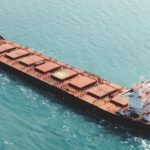The West Coast dockworkers union’s bankruptcy filing puts a dent in the armor of one of the country’s most powerful labor groups, an organization that includes 22,000 members who handle virtually all U.S. seaborne trade from Seattle to San Diego.
The International Longshore and Warehouse Union filed for bankruptcy over the weekend to fend off a judgment holding it liable for what a federal jury found to be illegal slowdowns and work stoppages at Oregon’s Port of Portland.
An ILWU spokesman said the union will operate as normal “throughout the restructuring process.”
The union, which describes itself as democratic and militant, controls the hiring of dockworkers and their daily dispatch to work at cargo-handling terminals at 29 ports from Washington state to California. Its territory includes the nation’s busiest container port complex, at Los Angeles and Long Beach, the main gateway for imports of toys, clothes, electronics, furniture and consumer products from Asia.
“They have enormous leverage because the members of the union have typically acted in concert,” said Paul Bingham, director of transportation consulting at S&P Global Market Intelligence. “If they [struck], the entire coast would be shut down.”
The ILWU has demonstrated during highly contentious contract negotiations in recent years that it doesn’t need to strike to show its muscle. Its work actions—slowing or stopping operations at cargo-handling terminals up and down the coast—have helped the union maintain jobs that include some of the most generous wages and benefits of any union in the country.
Average annual earnings for a full-time registered longshore worker on the West Coast last year was $211,000, according to the Pacific Maritime Association, which represents port employers.
The bankruptcy filing shows the union’s tactics aren’t always without risk.
The union was found liable at the Oregon port for hurting revenue at a subsidiary of the Philippines-based maritime company International Container Terminal Services Inc.
A federal jury in 2019 found that the ILWU coordinated work slowdowns and stoppages at the terminal because of a dispute over whether ILWU workers or members of another union would perform work handling refrigerated shipping containers. ICTSI was initially awarded $93.6 million, a sum that was later reduced to $19 million.
ICTSI rejected the reduced amount. The ILWU filed for bankruptcy ahead of a retrial set for next year saying it couldn’t afford legal fees to fight the case or any damages that may be awarded.
The union’s only material asset is its $9.5 million in cash on hand, ILWU President Willie Adams said in a bankruptcy court filing in San Francisco. The ILWU plans to pay most of that cash to ICTSI to resolve their dispute while retaining a working capital reserve big enough for the union “to maintain its operations and rebuild,” Adams said.
The union said in court papers it is current on its other obligations.
Eric Snyder, chair of the bankruptcy department at law firm Wilk Auslander, said the bankruptcy filing could lead the union to think twice before embarking on future work slowdowns.
“They must realize now that they are really going to run a risk if they do this again, and that they’re going to get caught again in a potential lawsuit that might bankrupt them,” Snyder said.
Still, the Portland case so far hasn’t stopped the union from continuing its tactic of slowing and stopping operations in disputes with employers, according to port employers.
During drawn-out negotiations over a new multiyear contract for West Coast dockworkers that began in 2022 and ended this summer, terminal operators accused ILWU members of deliberately with holding labor or slowing operations.
The talks were also held up for several months because of a dispute about whether certain jobs at the Port of Seattle should be carried out by the ILWU or by members of another union
Source: Hellenic Shipping News






